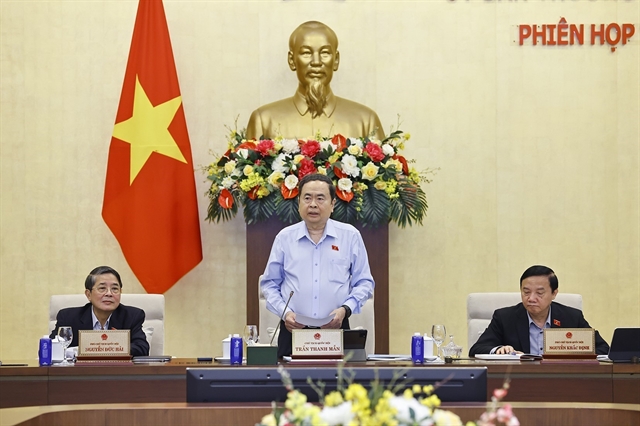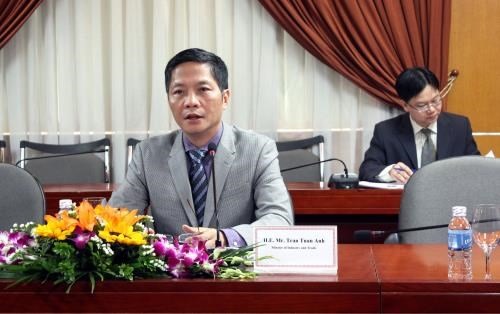 Economy
Economy

Minister of Industry and Trade Trần Tuấn Anh speaks to Vietnam News Agency about achievements in 2018 and challenges for the industry and trade sector this year.
 |
| Minister of Industry and Trần Tuấn Anh. |
Minister of Industry and Trade Trần Tuấn Anh speaks to Vietnam News Agency about achievements in 2018 and challenges for the industry and trade sector this year.
What were the sector’s achievements last year? What about plans for this year?
In 2018, the industry and trade sector recorded remarkable developments to play an important role in the national economy and contribute to macro-economic stability and the general economic development of Việt Nam. It gained all targets and even exceeded the Government’s requirements.
The Ministry of Industry and Trade was one of the first ministries to finish cutting 675 investment and business conditions, creating an open environment for investment and development activities and improving efficiency in State management.
This was a good foundation for the ministry to hit the targets set by the National Assembly for last year, namely the growth of total export value at 7-8 per cent and the ratio of trade deficit over total export turnover at less than 3 per cent. Therefore, this year, the Ministry of Industry and Trade will continue to closely follow market developments to have optimal business and production plans to contribute to the GDP growth of industrial sectors.
The ministry will also develop export markets, exploit free trade agreements (FTAs) and deal with trade protection trends and technical barriers in import markets.
It will continue to reform methods of trade promotion, improve efficiency in trade promotion activities and expand import markets in tandem with developing the domestic market.
This year, the ministry will ensure export and import balance and strive to achieve total export turnover growth of about 8.2 per cent compared to 2018 and control the ratio of trade deficit over the total export turnover at below 2 per cent.
It will also improve the ability to resolve trade disputes and defence to protect national interests and the interests of the local manufacturing sectors, businesses and individuals, and create an equal competitive environment.
The Comprehensive and Progressive Agreement for Trans-Pacific Partnership (CPTPP) came into effect while the Việt Nam-EU FTA is expected to take effect this year. However, political and trade tensions globally will create challenges for Việt Nam’s exports. What will the ministry do to maintain export growth?
Those agreements will help Việt Nam attract more FDI, creating new resources for domestic production. Besides that, domestic investment is supported by optimistic sentiment and stability in monetary policy, exchange rates and interest rates being maintained.
The ministry will study legal documents to amend and supplement existing regulations, aiming at implementing the CPTPP as well as other FTAs.
However, exports this year continue to face challenges such as many unstable factors in the world economy, while economic and trade policies of large economies like the US and EU can change unexpectedly, which has multi-dimensional impacts.
Meanwhile, the tightening of monetary policy that has taken place earlier than expected in many economies has reflected the cautiousness of countries for world economic growth forecasts.
To deal with those situations, in past years, the Government, the Ministry of Industry and Trade, other ministries and sectors have implemented many solutions to reduce risks from concentration of commercial activities on major partners.
Notably, the development of export markets has been appreciated and achieved positive results. Besides the US and China, other markets such as the EU, South Korea, Japan and ASEAN are also major trading partners with strong export growth.
In addition, the ministry has also implemented trade promotion activities to support local businesses in selling products, aiming to stimulate domestic production.
What will the ministry do to reach its targets this year despite the many pressures from domestic and foreign markets?
The ministry will face many pressures during monitoring and managing many fields that directly affect the daily life of people and business activities. However, these pressures will be dynamic for the ministry in its missions this year.
In reforming and restructuring the industry and trade sector, the ministry must take the operational efficiency of enterprises and people’s satisfaction as the final evaluation criteria in the industry’s activities.
Therefore, each field must have action plans to gain its targets. Especially, the responsibilities of specific units and individuals must be determined in implementation of those missions.
In 2019 and beyond, the industry and trade sector will have many tasks so it must strive to complete those tasks.
Besides continuing to simplify and reduce administrative procedures managed by the ministry, it will strictly control the issuance of new administrative procedures from the drafting stage.
Also, the ministry will strengthen application of information technology, build e-Government and promote both quantity and quality of online public services on the ministry’s portal, the national single-window mechanism and the ASEAN single-window mechanism. — VNS




